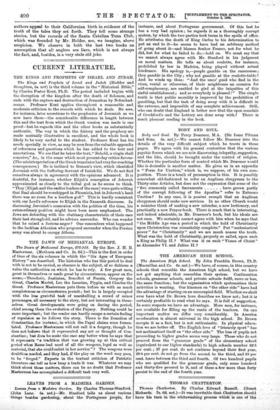CURRENT LITER,ATURE.
THE KINGS AND PROPHETS OF ISRAEL AND J17DAH.
The Kings and Prophets of Israel and Judah (Hodder and Stoughton, Gs. net) is the third volume in the "Historical Bible," by Charles Foster Kent, Ph.D. The period included begins with the disruption of the kingdom after the death of Solomon, and ends with the capture and destruction of Jerusalem by Nebuchad- rezzar. Professor Kent applies throughout a reasonable and moderate criticism to the records with which he deals. He sees, for instance, later accretions to the prophecies of Jeremiah as we now have them—the considerable difference in length between this and the text from which the Greek version was made is one proof—but he regards this and the other books as substantially authentic. The way in which the history and the prophecy are made mutually illustrative is excellent, and the whole book is likely to be very useful to the student. Professor Kent has his needs specially in view, as may be seen from the valuable appendix of references and questions which he has added to the text and annotations. We see that he takes the text," Behold, a virgin shall conceive," Itc., in the sense which most present-day critics favour. (The misinterpretation of the Greek translator had very far-reaching consequences.) He is inclined to Bunsen's view, which identified Jeremiah with the Suffering Servant of Isaiah liii. We do not find ourselves always in agreement with the opinions advanced. It is doubtful, for instance, whether Elijah's conception of Jehovah approximated as closely to the tribal god as he seems to think. "They [Elijah and the earlier leaders of the race] were quite willing that Baal should be worshipped in Phoenicia, but in Jehovah's land there was no room for a heathen god." This is hardly consistent with our Lord's reference to Elijah in the Nazareth discourse. In discussing Jeremiah's connexion with the politics of the time, his extraordinary position might have been more emphasised. The Jews are defending with the obstinacy characteristic of their race their last stronghold, and he advises surrender. Who can wonder that he raised a furious anger ? One remembers what happened to the luckless Athenian who proposed surrender when the Persian army was about to occupy Athens.


























































 Previous page
Previous page